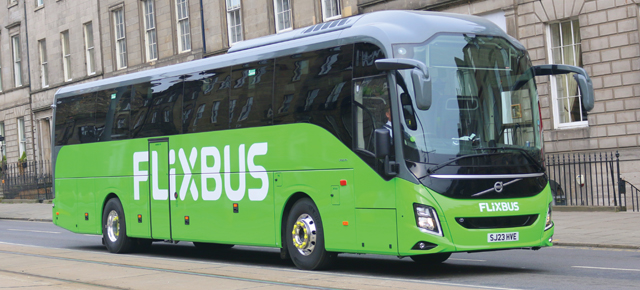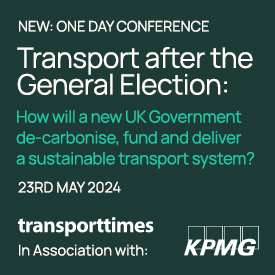‘We are here to build the largest intercity coach network’

FlixBus launched its expanded Scottish network last week with celebrations and free cake at Edinburgh bus station.
The move comes not long after the global intercity coach service brand celebrated two anniversaries – its second anniversary in the UK market and the tenth since it its creation.
The expansion in Scotland, undertaken in partnership with operator McGill’s, Scotland’s largest independent bus operator, marks a five-fold expansion.
The partnership between McGill’s and fast-growing FlixBus began in 2021, fuelled by a joint ambition to disrupt the coach market. McGill’s has added 18 high specification Volvo 9700 coaches to its FlixBus services, in addition to the existing seven vehicles.
Across the whole of the UK, Flixbus will have twice as many services this summer as it did last summer, when it celebrated its one millionth UK customer
Across the whole of the UK, Flixbus will have twice as many services this summer as it did last summer, when it celebrated its one millionth UK customer, and is being promoted with £2 tickets to mark the two-year UK anniversary. FlixBus has outperformed its forecasted UK figures this year, almost doubling passengers (94% increase) carried in April-September 2022, compared to the same period in 2021.
Globally, FlixBus is already the world’s largest intercity coach provider. It is present across Europe and the purchase of Greyhound last year made it the largest in North America. It is already operating in Brazil and Chile is next. So it has plenty of experience of running large scale networks, and the company is not short of ambition.
Speaking at the Edinburgh bus station launch last week, Andreas Schörling, managing director of FlixBus UK told Passenger Transport: “We were very clear when we entered the UK market that we are here to build the largest intercity coach network in the UK. It’s going to be a five-year project. We are … strategically patient, but that is the clear vision that we have.
The first two years have been, I would argue, almost beyond expectation. We’ve seen phenomenal uptake from passengers. There is massive demand
“The first two years have been, I would argue, almost beyond expectation. We’ve seen phenomenal uptake from passengers. There is massive demand.”
The striking FlixBus brand is backed up by sophisticated online retail channels and a marketing message that focuses on coach as an affordable, reliable and sustainable mode of transport. Born in the digital era, the company has created from scratch an offering that appeals to new demographics.
Schörling said: “The mission that we have as an organisation is to provide smart and green transportation to everyone, everywhere … I think, as an industry, coach has not made a strong enough case for how good a solution it is. I think that is something that we at FlixBus have an opportunity and the tools to change.”
In the UK there has been a bit of a mindset that it is just certain demographics that travel with coac
He continued: “In the UK there has been a bit of a mindset that it is just certain demographics that travel with coach, and what we are seeing across Europe, across the US and all our other markets is that by being a digital native, being able to use marketing channels, communication channels where a broader proportion of the population is, actually attracts them into coach because … it’s affordable, reliable and sustainable. When people know about it they come.
“The reason we don’t have such a diversified demographic in the UK is a failure of communication.”
Schörling spoke of the importance of the partnerships with Volvo and McGill’s (an announcement about a further partner operator will be made soon). All three of these companies agree that coach is an unsung hero of transport and that government could do more to support the sector.
“What we are looking for is a level playing field,” said Schörling. “There is so much support coming into the trains and to the railway system in terms of infrastructure, in terms of tax subsidies, in terms of financial subsidies, and coach really gets nothing.
“Small and medium-sized coach operators are the unsung heroes of the transportation industry. Whenever something goes wrong people always look to coach.”
This story appears in the latest issue of Passenger Transport.
DON’T MISS OUT – GET YOUR COPY! – click here to subscribe!








